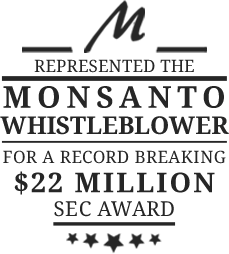What Does a Wall Street Whistleblower Do?
It’s fair to say that people often hear about “Wall Street whistleblowers” in the news without fully understanding what the term means. Even people who are in a good position to actually become a Wall Street whistleblower might not fully realize what doing so could mean for their future or what options are available for them.
In the simplest terms, a Wall Street whistleblower is someone who “blows the whistle” on corrupt or fraudulent activities taking place in the securities industry (for which Wall Street in New York City is home base). This reporting is usually made to the US Securities and Exchange Commission (SEC), who will often reward the whistleblower with a substantial sum of money if certain criteria are met.
What Do Whistleblowers Expose?
Securities fraud is widespread, varied, and often difficult to detect without the help of whistleblowers. The type of activity the SEC is most interested in involves materially misleading investors so that they make buying and selling decisions concerning stocks that they might not have made had they been fully and accurately informed.
By informing the SEC, Wall Street whistleblowers protect these investors from losing large sums of money on what are actually poor or risky investments, sometimes protecting their life savings. Securities fraud could take the form of insider trading, inadequate corporate disclosures, pyramid schemes, market manipulation—any dishonest, misleading, or incomplete information or activity that could harm investors.
Why Become a Wall Street Bank Whistleblower?
Not only does whistleblowing protect investors from scams and fraudulent activity, it can also yield substantial financial rewards. If a Wall Street whistleblower submits a tip to the SEC that is original, voluntary, and results in sanctions worth more than $1,000,000, the whistleblower could be rewarded between 10 and 30 percent of the fines collected. In some cases, whistleblowers have been awarded millions of dollars for their contribution to the SEC investigation.
Whistleblowing does have its risks, unfortunately. This is why whistleblowers are granted certain legal protections under both the Sarbanes-Oxley and Dodd-Frank Acts. You can even become a whistleblower if you aren’t a company insider, as Dodd-Frank expanded the protections to include employees of subsidiaries and outsiders who discover fraud through independent analysis.
Furthermore, by working with a Wall Street whistleblower lawyer, you can submit a tip to the SEC and remain anonymous. This creates a situation in which those with knowledge of securities fraud and inadequate disclosures can come forward with what they know, be protected, and be handsomely rewarded.
Receive a Free and Confidential Tip Evaluation
If you think you have information or evidence that could expose stock fraud or corporate corruption, contact Meissner Associates for a free, confidential tip evaluation. We’ve been helping whistleblowers receive monetary awards for their information since 2001 and were responsible for the largest accounting-related SEC whistleblower reward to date.
To find out if you have a tip that could make you a Wall Street whistleblower, give us a call at 1-866-764-3100 or complete the confidential tip submission form at the bottom of this page.









